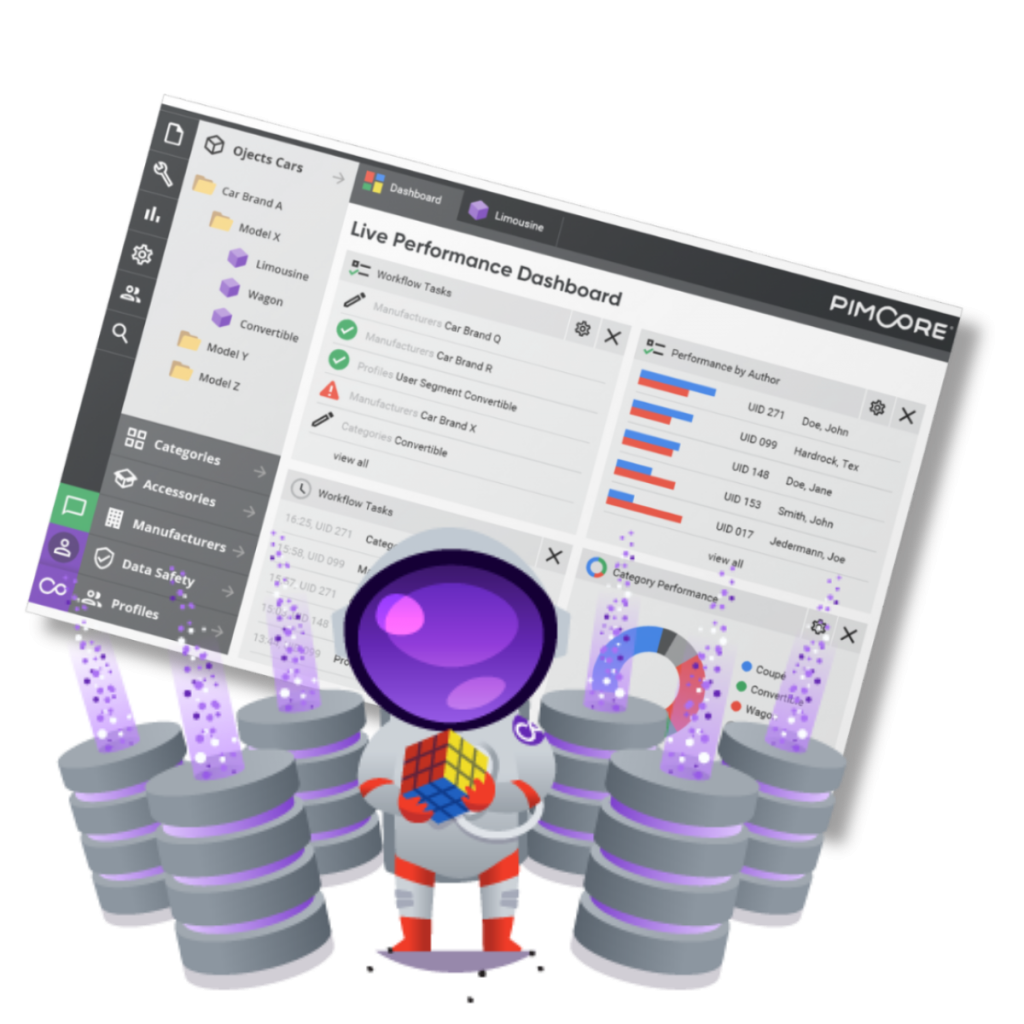Master Data Management Solutions
Get accurate, unified data, and improve decision-making with robust master data management solutions. Ensure consistency, compliance, and reliability across your entire enterprise.


Master Data Management Solutions
Master Data Management Expertise to Drive Your Success
Companies generate vast amounts of diverse data—from customer and product information to vendor, location, and financial data. Effectively managing and utilizing this data is crucial for driving growth and maintaining a competitive edge. Master Data Management (MDM) is the key to transforming how companies manage their critical data assets, ensuring data consistency and unlocking its full potential.
We, at Minds Task, understand the importance of adaptable MDM solutions tailored to the unique requirements of businesses. A robust MDM strategy provides the foundation for digital transformation, enabling organizations to adapt quickly to changing market dynamics and seize emerging opportunities.
Key master data management challenges:
- Inconsistent Data Quality: Organizations struggle with maintaining consistent and accurate master data across different systems and databases. Poor data quality leads to errors, duplication, and misinformation, undermining decision-making processes.
- Data Silos: Many organizations have data spread across various departments, systems, and applications, creating data silos. These silos restrict the flow of information, making it difficult to have a unified view of the organization’s data.
- Lack of Standardization: Without proper data standards and guidelines, organizations face the challenge of inconsistent data formats, naming conventions, and data structures. This lack of standardization hampers data integration and interoperability efforts.
- Limited Data Governance: Organizations often struggle to establish effective data governance practices. When not defined accurately, it impacts ownership, responsibility, and accountability, resulting in data inconsistencies and conflicts.
- Complex Data Integration: Integrating master data from multiple sources and systems can be complex and time-consuming. The fragmented integration leads to data discrepancies, delays in data availability, and challenges in maintaining data integrity.
- Scalability Issues: As organizations grow and their data volumes increase, managing and scaling master data becomes more challenging. Legacy systems and manual processes may be unable to handle the growing demands, leading to inefficiencies and data management bottlenecks.
- Regulatory Compliance: Organizations must comply with various data protection and privacy regulations. Managing master data in compliance with these regulations, such as GDPR or CCPA, poses additional challenges regarding data handling, consent management, and data security.
What Problems A MDM System Solves
Data Fragmentation
Organizations often have multiple systems and applications that store and manage data independently. This leads to data fragmentation, where the same type of data is duplicated, inconsistent, or incomplete across various systems. MDM software helps consolidate and centralize master data from different sources, eliminating data silos.
Data Inconsistency
Inconsistent data across systems can cause errors, confusion, and inefficiencies in business processes. MDM software enforces data governance rules and standards, ensuring consistency in the structure, format, and quality of master data. It provides mechanisms to validate, standardize, and cleanse data, minimizing discrepancies and inaccuracies.
Data Accessibility
Data accessibility is the ability for users to easily find and use the data when and where they need it. MDM software offers a centralized repository or hub to store and manage master data, making it easily accessible to authorized users across the organization. The centralized view of master data enhances data visibility, collaboration, and decision-making processes.
Data Duplication
Duplicate data can be a significant issue that wastes storage space, leads to redundant processing, and hampers decision-making. MDM software employs techniques such as data matching, deduplication, and record consolidation to identify and eliminate duplicate records, creating a clean and reliable dataset.
Data Governance
MDM software provides a framework for establishing and enforcing data governance policies, rules, and workflows. It helps organizations maintain data integrity, enforce data access controls, and ensure compliance with regulatory requirements such as GDPR, HIPAA, or industry-specific regulations.
Data Interoperability
MDM software supports data integration across disparate systems and applications. It provides data integration capabilities like data mapping, transformation, and data synchronization to ensure seamless data exchange and interoperability between systems.
Manual data processes
Manual data processes are prone to human error, leading to inaccurate and inconsistent data. This can harm businesses. MDM platforms provide a variety of automated data processes that can help you to improve the efficiency and accuracy of your data management operations.
Data security
Data security refers to data protection from unauthorized access, use, disclosure, disruption, modification, or destruction. But, it is a big challenge for any organization. MDM systems can help to improve data security by implementing access control, data encryption, and other security measures.
Data Lifecycle Management
MDM software helps manage the lifecycle of master data from creation to retirement. It enables data governance teams to define data ownership, stewardship roles, and workflows for data maintenance and updates. It also facilitates data archiving and purging, ensuring data is retained per business requirements.
Our Master Data Management (MDM) Services
At Minds Task Technologies, we deliver comprehensive MDM services tailored to your unique business needs. With our expertise and cutting-edge technologies, we empower organizations to harness the full potential of their data assets. Here’s how we can help you implement a successful MDM solution:
Our MDM Services
MDM Strategy Development
Our experienced data management experts will collaborate closely with your organization to understand your goals and challenges. We'll develop a customized MDM strategy that aligns with your business objectives, ensuring maximum impact and ROI.
Data Governance and Standardization
We assist you in establishing robust data governance frameworks, ensuring data consistency, integrity, and compliance. Our experts leverage industry best practices to standardize your data models, taxonomies, and metadata, enabling accurate and reliable reporting and analysis.
Data Quality Management
We implement data quality management processes to identify and resolve data inconsistencies, duplicates, and errors. By improving data quality, we enhance the reliability of your business intelligence, enabling you to make better-informed decisions.
Data Integration and Master Data Hub
Our team employs advanced integration techniques to unify data from disparate systems into a centralized Master Data Hub. We help you create a single, consistent view of critical data entities such as customers, products, and suppliers, facilitating accurate reporting, analysis, and decision-making.
Data Migration Services
Our data migration services provide seamless and efficient data transfer from one system to another. Our expertise ensures a smooth transition, minimizing disruptions and data loss. Our services include data analysis, mapping, cleansing, and validation to ensure data accuracy and integrity during the migration process.
Change Management and User Adoption
We understand that successful MDM implementation goes beyond technology. Our change management experts will guide your organization through the transition, ensuring seamless user adoption and minimizing disruption to your operations. Our team works closely with you to execute your MDM strategy.
Our Approach
- Conduct Discovery and Assessment
We conduct a comprehensive analysis of your existing data landscape, systems, and processes to identify areas of improvement and opportunities for MDM implementation.
- Establish Data Governance Framework
We establish a robust governance framework that defines data ownership, accountability, and access controls. We ensure data integrity and compliance with your regulatory requirements.
- Perform Data Profiling and Cleansing
We thoroughly profile your data, identify data quality issues, and implement cleansing processes to eliminate duplicates, inconsistencies, and inaccuracies.
- Design and Implement the Solution
We don’t stop at implementation. Our proactive approach includes continuously monitoring your data management processes and optimizing the solutions to drive maximum efficiency, performance, and ROI.
Benefits to Clients
- Improved data quality: Help improve data quality by eliminating duplicate data, ensuring data is consistent across systems, and making it easier to keep data up-to-date
- Increased efficiency: Boost efficiency by automating many manual tasks involved in data management, such as data entry and validation.
- Improved decision-making: Provide businesses with a single, unified view of their data, which can be used to make better decisions about everything from product development to marketing campaigns.
- Improved compliance: Help businesses comply with various regulations, such as those governing financial reporting and customer privacy. This can help protect businesses from fines and penalties and improve their reputation with customers and regulators.
- Improved customer experience: Help businesses provide a better customer experience by providing a single, unified view of their customer data.
- Increased agility: Provide you with a single, up-to-date view of their data, which can be used to make faster decisions and take advantage of new opportunities.
- Reduced costs: Minimize costs by eliminating the need for multiple data silos, reducing the need for manual data entry, and improving data accuracy.
Additional Product Information Management Resources
Learn more about PIM and how to apply it in your organization with these resources.
Insights: What is PIM (Product Information Management)
Blog: List of Top Product Information Management Software
Case Study: Lighting Manufacturer Improves Operational Performance with Pimcore PIM
Case Studies
FAQ on Master Data Management Services
MDM is a process for managing critical data about key organizational entities, such as customers, products, and suppliers. It helps ensure this data is accurate, consistent, and up-to-date across all systems and applications.
Master Data Management is crucial because it helps organizations achieve a single source of truth for their data, enabling better decision-making, improved operational efficiency, and enhanced customer experiences. It eliminates data silos, reduces data duplication, and ensures data consistency and accuracy across systems.
There are two main types of MDM solutions: on-premises and cloud-based. On-premises MDM solutions are installed and maintained on the organization’s servers. Cloud-based MDM solutions are hosted and managed by a third-party vendor.
Organizations should consider their specific needs and requirements when choosing an MDM solution. Some factors to consider include the size and complexity of the organization, the type of data to be managed, the budget, and the level of support required.Organizations should consider their specific needs and requirements when choosing an MDM solution. Some factors to consider include the size and complexity of the organization, the type of data to be managed, the budget, and the level of support required.
Implementing an MDM solution is a complex process that should be carefully planned and executed. The first step is to assess the organization’s current data landscape and identify the critical data that needs to be managed. Once the essential data has been identified, the next step is to select an MDM solution that meets the organization’s needs. The final step is to implement the MDM solution and train users on how to use it.

